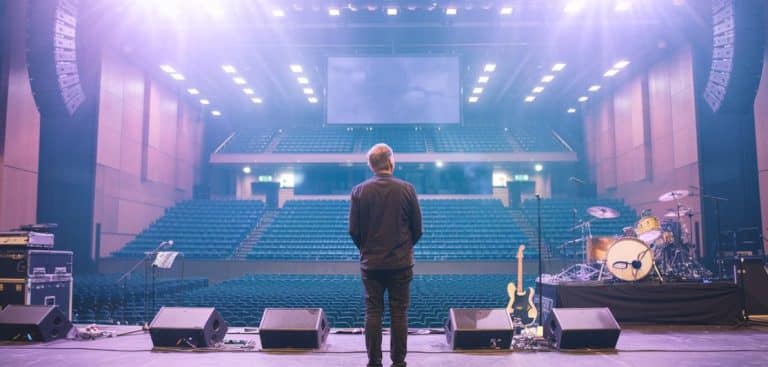You’ve rented the venue, hired the bands, and checked your budget twice (or more) — only to find that a pile of surprise receipts show up afterward. So what gives?
Though event planners usually anticipate some extra costs here and there when setting a budget for an event, even the most seasoned ones can find themselves facing surprise fees.
These fees are often due to hidden costs associated with existing services that go completely unnoticed, many of which are billed per person, per unit, or sometimes as “add-ons” to set up the venue for the event.
Thankfully, awareness is all you need to keep your spending and event budgets in check. This article will run through how hidden costs can manifest in concerts and festivals, and it will also discuss the most common budget items to look out for.
Top 10 hidden event costs to look out for
Hidden costs are everywhere — and they’re only preventable if you track your event finances on the day of the event.
While many hidden costs are associated with unexpected events and risks, others lurk in the fine print of contracts. Here are some of the most common hidden costs of festivals, concerts, and other entertainment events to keep in mind when event budgeting.
1. Liability and insurance
Getting adequate insurance and liability coverage can be easily overlooked during event planning, especially for more low-key events. Though premiums can be hefty, they can help avoid even bigger “hidden costs” that may result from future accidents.
In most cases, event insurance is split into two major categories:
- Event liability: This covers the risk and liability of the event itself, which usually includes property damage, attendee injuries (such as slipping and falling), and liquor/host liability if the event is serving alcohol.
- Event cancellation: This covers the financial loss of canceling the event due to weather, natural disasters (flooding, earthquakes, etc.), or even a major event such as a terrorist attack.
Be prepared to provide your insurance provider with detailed plans of your event’s logistics, management, and any medical and security personnel who will be there.
Your provider may also want to know your load-in and load-out dates, and your track record of successful event planning. Additionally, you may be required to provide evidence of insurance coverage for any other vendors (food, beverage, etc.) at the event.
While accounting for things like earthquakes and terrorism may seem like overkill, it’s better to expect the unexpected so you can avoid the actual costs that come with the unexpected.
2. Permits and licensing
Many music events and festivals also require special permits and/or licensing, depending on the locale and its bylaws. While most seasoned event planners are already aware of this, extra permits (and often extra costs) may be required to host food vendors, alcohol sales, and other on-site amenities.
While permitting requirements will vary depending on where you host the event, most concerts and festivals will need the following:
- Mass gathering permit: Allows crowds and gatherings over a certain size (e.g., >1,000).
- Sound permit: Allows music and other loud noises at a certain time and for a specific duration of time and/or level of loudness (in decibels).
- Structural permit: Allows the construction of temporary structures, such as the staging, lighting rigs, and grandstands required for the event.
- Food and alcohol permit(s): Allows the sale and/or consumption of food and alcohol at the event. Vendors will likely need their own permits and insurance.
- Fireworks permit: Allows the launching of fireworks, often with specific guidelines for when, where, and how the fireworks can be launched.
…And the list goes on. Contact your local municipality with your event plans to ensure you get all the necessary permits and licensing. It goes without saying that the fines associated with not having a permit can quickly become a major hidden cost!
3. Lighting and visual equipment
Many music events and festivals require extensive lighting — and not just on the stage. From perimeter and fence lighting to other specialty audiovisual equipment, event planners can quickly find themselves overrun with equipment rental and other production costs.
One of the highest unexpected costs in this category is event technology, such as visual effects. While stage lighting for a concert is fairly easy to account for, surprise costs can occur when fog machines, confetti blowers, and other “effects” come into the mix.
Regardless of the equipment, avoiding hidden costs comes down to accounting for everything in your initial plans. While there should always be a buffer for the occasional broken light or burnt-out bulb, thorough lighting and audiovisual planning is your best mitigation strategy.
4. Power consumption
From lighting to speakers and just about everything else, delivering a high-powered performance requires, well, a high amount of power. In the likely event that the venue doesn’t foot the electricity bill, event planners can find themselves surprised by electricity costs afterward!
One of the highest hidden costs here is having to supply your own power through a generator. If your event is in an open field or somewhere without direct power lines, you’ll have to ensure that power can be generated for not only the stage and lighting but also all the extra equipment, signage, common spaces, food vendors, and so on.
Note that venues with a power supply may also need a supplementary generator to supply additional power. Be sure to list the total power requirements for your equipment. Then, compare that figure with the available power supply to see how much extra you might need. You may need to adjust your plans if the power costs exceed your event budget.
5. Backstage food and drink
After booking musicians, DJs, and all their equipment, it’s easy to forget that all of these people (and everyone else backstage) need to eat and drink to keep the show going! The cost of backstage food and drink can quickly add up, especially when there are many musicians and supporting staff.
Food and drink made available to entertainment staff are usually known as craft services. While small-scale events don’t always need it, festivals and concerts with many musicians and supporting staff should provide craft services to everyone involved. You may need to hire a specialized caterer if the entertainment isn’t providing their own.
Venues that already serve food may be able to help, but be sure to check and plan for everyone first to avoid empty-stomached entertainers. Note that this is usually only possible for small events, and the venue might charge for the convenience.
6. Waste control
All events generate at least some waste, and music events are certainly no exception. While many venues handle their own trash removal, larger concerts and festivals typically require extensive (and expensive) waste management to keep things sanitary.
This is especially true for events held in outdoor areas and those without any waste infrastructure. Common waste control equipment and tasks that can generate hidden costs include:
- Portable toilets and sinks
- Trash bins
- Dumpster rental and removal
- Litter cleanup
- Venue cleanup
- Sanitation and food safety
7. Parking and transportation
Many music festivals and concerts require transportation and parking to deliver guests to and from the venue. As a result, event planners may find themselves facing additional costs for renting a parking space, hiring attendants, and even renting shuttle buses.
If your event requires dedicated transportation, then it’s often most convenient to work with a dedicated transportation company. A good transportation company will not only have a large enough fleet but will also provide drivers and usually have the right insurance to cover any associated liabilities.
As with any vendor, be sure to get expected costs in writing with set rates for mileage, the number of passengers, driver fees, etc. You should compare these costs with the final invoice after the event to avoid (or challenge) any unexpected or hidden fees.
If your event also needs parking, make sure the venue has not only adequate space but also the zoning and permission to handle additional cars. You may need to arrange for extra parking spaces in a nearby lot or garage, as well as valet staff.
8. Accessibility
It’s more important than ever to ensure that all music fans can access the performers and artists they love. Unfortunately, it’s easy to overlook additional measures (and additional expenses) to ensure accessibility, such as renting temporary stair ramps.
The first step in assessing accessibility is to tour the venue itself. While some venues can easily accommodate disabled people, others — such as those with narrow staircases or uneven floors — can’t. In any case, always be sure you know exactly who and what your venue can and can’t accommodate, and make these restrictions clear to potential attendees before they purchase their tickets.
But what about the things you can accommodate for? In this case, you may simply want to ask attendees to list their requirements in their RSVP or initial signup. Note that accessibility isn’t limited to physical obstructions; some people may have special requirements regarding light, sound, and food allergies.
9. Ticketing expenses
Tickets don’t just cost the audience money — they can also cost you money!
From the simple cost of printing to paying ticket sale commissions and attendant fees, tickets can be more expensive than their initial price.
Some of the biggest hidden costs of ticketing are the service fees and order processing fees of online ticket vendors such as Ticketmaster. These fees are notorious for often being steep, and some vendors might have customers footing the bill. Other ticketing fees include delivery, taxes, printing, and any related facility fees.
Check with your ticketing vendor or agent to make sure you get the total cost per ticket.
10. Staff changes and other contingencies
Think you’ve hired the perfect staff for your event? You may have to think again. Any number of circumstances can cause even your most valuable players to jump ship at the last minute, leaving you scrambling to hire expensive, last-minute replacements.
There’s little you can do to avoid or plan for this kind of hidden expense. Instead, be sure to leave an ample buffer in your budget to hire one or two particularly expensive staff at the last minute. With a large enough contingency fund, you’ll likely come in under budget while also leaving room for other hidden event expenses.
How to avoid hidden costs in event budgeting
Now that you know the hidden costs that often lurk backstage, it’s time to put the right plans in place to avoid them in the budgeting process.
In most cases, avoiding hidden costs comes down to fine details and setting an accurate budget. Whether it’s reading the fine print of a vendor contract or fine-tuning your event goals, attention to detail may be all it takes to keep your budget in the black and ensure event success.
Read the fine print
Sometimes, even the most common costs show up in the most uncommon places.
Take an extra look at the fine print of each contract to see which circumstances or services are subject to extra fees. Be sure to account for every possible circumstance, and communicate clearly with your vendor(s) to avoid any ambiguities.
Understand the scope of each service
While you’re reading the fine print, also make sure that the scope of the service is clearly defined in numbers, such as the number of hours and sets, to avoid costly “scope creep” of opportunistic vendors.
If you’ve done your due diligence, dealing with surprise costs can be as simple as comparing the original estimate with the final invoice. If your vendor does have to exceed the budget to provide the right service, they should have clearly defined plans in place for doing so.
Anticipate volume
As many costs come down to per person or unit, it’s crucial to anticipate volumes such as the number of attendees and seats required.
It’s also best practice to leave a little wiggle room in case of a larger-than-anticipated turnout. Note that each person will consume a certain amount of space, use a certain amount of utilities, and consume a certain amount of food and drink.
Include a buffer in your budget
Even the most well-calculated budgets can easily go overboard.
In addition to leaving a buffer for extra audience members and services, leave a budget buffer to match. As mentioned earlier, it’s good practice to set aside a substantial contingency fund for unexpected staff changes as well as lighting, waste control, and power.
Budget for the unexpected with TicketFairy
No matter your event’s size and scope, TicketFairy can help streamline the event-planning process — and save you money as a result.
By combining ticketing and event marketing into a single, convenient platform, TicketFairy allows concert and festival planners to avoid using expensive ticket agents while selling 20% more tickets on average. TicketFairy is also here to help finance your event deposits to get your future events off the ground.For more information, book a free demo call or explore our event financing options.



